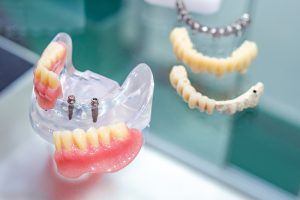Mini dental implants are smaller in size than traditional dental implants. They typically range in diameter from 2mm to 3.5mm, while traditional implants range from 3.5mm to 6mm in diameter.
2mm to 3.5mm, while traditional implants range from 3.5mm to 6mm in diameter.
The smaller size allows for a more conservative approach to implant placement, particularly in areas of the jawbone where there may be limited bone density. In many cases, mini dental implants can be placed with minimal or no bone grafting, saving patients time and money.
Miniature dental implants are made of the same materials as traditional implants, such as titanium or zirconia. Their design mimics the structure and function of natural tooth roots, providing a stable foundation for dental appliances such as single dental crowns, bridges, or dentures.
Mini Dental Implant Benefits
The mini dental implant treatment offers various benefits, including:
- Mini implants don’t require as much bone density as traditional implants, making them a good option for individuals who have experienced bone loss due to periodontal disease or other factors.
- The placement procedure for mini dental implants is typically less invasive and may require less recovery time than traditional dental implants.
- Miniature dental implants can support smaller dental appliances such as single dental crowns, bridges, or even dentures.
- Mini implants are typically less expensive than other dental implant options.
- Mini dental implants can mimic the structure and function of tooth roots, providing a natural look, feel, and function.
Mini Dental Implant Cons
While mini dental implants can be an excellent tooth replacement option, there are a few drawbacks patients should be aware of:
- Limited support: Since mini implants are smaller in diameter, they may not provide as much support for larger dental appliances. They’re often recommended for single-tooth replacements.
- Long-term durability: While made of strong, durable materials, mini implants don’t have the same long-term durability as traditional implants.
- Higher failure rate: Some studies have shown that the mini dental implant failure rate is higher than other implant treatments. However, the failure rate varies with the type of implant, the surgical technique, and post-operative maintenance.
- Potential for complications: As with any surgical procedure, there’s a risk of complications associated with mini dental implant placement. These can include infection, nerve damage, and implant failure.
- Cost: While mini implants tend to be less expensive than traditional implants, the cost can still be significant, and some dental insurance may not cover the cost of miniature dental implants.
Candidacy for Mini Dental Implants
Candidates for mini dental implants may include:
- Individuals with low bone density: Mini implants have a smaller diameter compared to traditional implants, meaning they don’t require as much bone density for support. This makes them an ideal option for patients who have experienced bone loss due to periodontal disease or other health problems.
- Patients who have lost one or more teeth: Mini implants can support a single dental crown or bridge or even stabilize a removable dental appliance such as a denture.
- Patients with removable dental appliances: Mini implants can be used to stabilize a removable dental appliance, such as a denture. They can provide a more secure fit and prevent the appliance from moving around in the mouth.
- Patients who prefer a less invasive option: The placement procedure is typically less invasive than traditional dental implant placement. This can be beneficial for patients who prefer a less invasive option or have medical conditions that make traditional implant placement more complicated.
Please note that mini dental implants aren’t suitable for every patient. Dental professionals will assess each individual’s case and determine if mini dental implants are the best option for them.
Cost of Mini Implants
The cost of mini dental implants will vary depending on several factors, including the number of implants needed, the location of the implant placement, and the type of restoration. In general, miniature implants are less expensive than traditional dental implants.
Learn more about the cost of dental implant options.
Frequently Asked Questions
While mini dental implants are smaller in size, they’re still made of strong, durable materials and can provide stable support for dental appliances.
With proper care and maintenance, mini dental implants can last a lifetime. However, the lifespan of a mini dental implant can be affected by factors such as oral hygiene, bite alignment, and overall health.
Mini dental implants are typically used to support a single dental appliance, such as a crown or bridge. In some cases, multiple mini implants can support a larger dental appliance, such as a multiple-tooth bridge or full-arch of dentures.
As with any medical procedure, there are potential risks associated with mini dental implant placement. These can include infection, nerve damage, or implant failure. Your dentist will advise you on any potential risks based on your case.
Complete Your Smile With Miniature Dental Implants, Call Today!
You can receive an effective and natural-looking tooth replacement if you suffer from low jawbone density. With mini dental implants, patients can achieve a complete smile along with improved oral health. Learn more about your tooth replacement options from your local dentist, or contact our Farmington dentists by dialing (505) 327-4863 today. We’re accepting new and returning patients from Farmington and surrounding areas such as Kirtland, Spencerville, and Bloomfield, NM.
